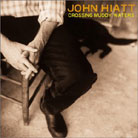February 2001
Crossing Muddy Waters meets those requirements to the letter. Here we just have Hiatt and two cohorts (Davey Faragher and David Immergluck) making all the music -- and it sounds like Hiatt is enjoying himself again, too. Perhaps that's because he is more in control of this album than any he's ever produced before -- both artistically and legally. While Vanguard Records has released this album, Hiatt owns it (he’s started his own record company). So, when Hiatt wanted to record an album this time out, the only person with the authority to tell him what to do was himself, and he knows what works best for him. Take the title track, for instance. The music fits the song perfectly -- there's not a single extraneous note. And the rest of the disc lives up to the standard it sets: This is the follow-up to Bring The Family -- Hiatt is once again singing about family, life and love. The sonics on Crossing Muddy Waters are, for the most part, first rate. Listen to "What Do We Do Now" and it's strikingly easy to follow the 12-string guitar used on the track. Likewise, the differences between the two different mandolins and the various guitars (for example, the nylon 6-string played by Hiatt throughout) on this disc are readily apparent. You’ll also have little trouble discerning the foot stomps from the bass notes, even though they overlap. There's also a discernibly specific acoustic space surrounding and enveloping the instruments, which adds to the illusion of being at the studio. Hiatt includes small amounts of pre-recording banter between himself and his musical associates, which I enjoyed. Before "Gone" and "Take Back" we hear Hiatt talking to the other musicians -- it's almost like taking part in the recording session. These bits of audio verité make the album, and Hiatt, seem more human. (Side note: there is a picture in the CD booklet of Hiatt leaning against a wall. Dammed if he doesn’t look just like John Dillinger.) About the only sonic problem I encountered here was with Hiatt’s vocals. They sounded a wee bit thin, just not as full-bodied as I would have liked. They made Hiatt seem just a voice appearing from nowhere, not like a man standing in front of you singing. Even so, it was easy enough to tell it was Hiatt you were hearing. Most of the songs on this album are vintage Hiatt, i.e. very strong -- the title track, "God’s Golden Eyes" and "What Do We Do Now" have already established themselves as personal favorites. Crossing Muddy Waters ranks up there with Hiatt’s best. The only tracks on the album that fell flat were the opener, "Lincoln Town" and "Mr. Stanley," and that may just be a matter of personal taste. Listen for yourself and decide. But never fear, the album is more than strong enough to carry a couple of, well, less than good songs. Let's hope that Crossing Muddy Waters is, figuratively and literally, a signal from Hiatt that he plans to stick with what works best for him -- being a singer/songwriter. When he concentrates on those aspects of his art, he is very nearly untouchable. More than a comeback album, this is a return to his roots. And now that he has returned, I’m looking forward to seeing what he finds on the other bank of that dirty old river. GO BACK TO: |
 John Hiatt - Crossing Muddy Waters
John Hiatt - Crossing Muddy Waters![[Reviewed on CD]](../format/regcd.gif) He’s
back! Yep, the John Hiatt of Bring The Family, Slow Turning and Stolen
Moments has returned to form and recorded an album much like those classics that
propelled his career into the big time. And not a moment too soon -- it seemed that Hiatt
was bent on becoming a rock star at the expense of what he did best. And that's
writing songs that strike a nerve -- that touch us, speak to us about our lives -- and
then recording those songs sparsely with as many acoustic instruments as possible.
He’s
back! Yep, the John Hiatt of Bring The Family, Slow Turning and Stolen
Moments has returned to form and recorded an album much like those classics that
propelled his career into the big time. And not a moment too soon -- it seemed that Hiatt
was bent on becoming a rock star at the expense of what he did best. And that's
writing songs that strike a nerve -- that touch us, speak to us about our lives -- and
then recording those songs sparsely with as many acoustic instruments as possible.